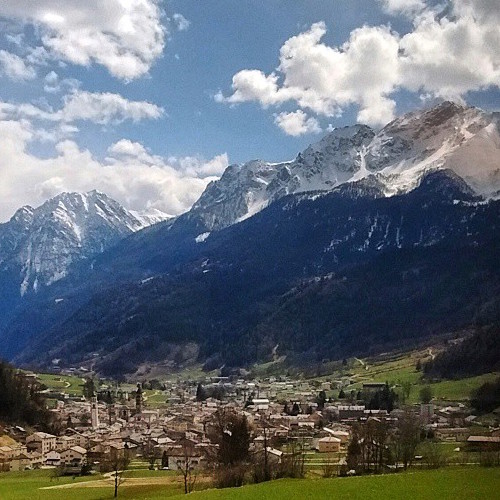
Adapted from the article published at Thoughtcatalog.com.
There is no rule that says only the rich can travel.
To say you wish you could afford to travel means, “I wish I had arranged my life values so that I could travel.” If you want to travel, then you do—we get to choose to experience things in our lives that make us happy.
When I received an email at my university about an international internship to teach in a sustainable project in Eldoret, Kenya, I applied on a whim.
I called my parents to tell them not to worry because I was sure I wouldn’t in a million years be accepted to the program.
I was.
This meant I got significant help in funding my first global trip. I was lucky, right? But, the travel bug had bitten (through all that mosquito netting) and I was not ready to call that my once-in-a-lifetime bout of adventure.
So, how do I afford to travel? By choosing to put certain things above others. By following what sets my own soul free:
1. Decide your priorities. Living and working to travel may mean not owning a house, a car, a gym membership or even an address. Instead I get itineraries, air-miles, travel cards and maps. People choose what is right for them—for some that is a wedding or a dream job, and that is just as good. When you choose that travel is important to you, like anything else, then you sacrifice and work for it.
2. Go all in. Apply to study grants, bursaries at school, positions that take you far away. If you work a job you hate, then quit! I don’t mean be foolhardy—never have more than one credit card or do anything you don’t want to answer to. But don’t measure your life and successes on what you can show on insurance claim papers. Good things happen and you will get lucky, but only if you go for it.
3. Know your goals. These don’t have to be a five-year or even five-month plan, but you need to know your skills and use them to help yourself out. There are different ways to gain the economic means to follow your heart. As a teacher, I use my qualifications to work in different spots, I choose a location I enjoy (next stop Spain) and then use money earned in short length positions in order to see as much as I can around an area. This kind of living doesn’t let me see the world in a year! Instead I experience real life gradually, as a citizen of the world. Sites like workaway.com allow you to find a place where you can stay for free in exchange for work. Summer camps hire counsellors, coaches, even lifeguards for a short term experience, this usually allows you to live with a family in the area as well as paying you a small living allowance for further travel. Decide what calls to you, and go for it!
4. Feed your soul, not your vanity: Vacationers buy shoes and jewellery and beaded things. Travellers collect pebbles from the beach where the sun sets best, photographs with people met that day, and notes scribbled on receipts. The scarf will never look as good as those moments feel.
5. It’s free to be brave. Don’t turn down experiences. Try free walking tours, go with people you just met to a magic fountain that lights up, climb a hill with an amazing view you overheard people talking about—even if it takes a few hundred stairs. Try everything.
6. Go where the locals go. It’s not easy, especially if you don’t have much time or know the local language, but just go for it and understand that you may not blend in, but that doesn’t mean you shouldn’t give it a shot. Take local transit, you will save tons compared to taxis and car rentals, not to mention the feeling of accomplishment when you somehow managed up in the right spot, usually with a story to tell. To really try being somewhere new, you have to give it a real attempt.
7. Use your feet. Local transit is great, but save even more by walking. You will get lost in a new city, panic that you can’t get back and have blisters for days from cobblestone roads. But then, the next time this happens, you will find it a little easier to know where you are. There is no better way to know a place than to walk and walk and walk. But for god’s sake, invest in a good pair of shoes!
8. Share what little you have. In hostels, on buses, waiting under a shelter in a downpour. Nothing forges lasting friendships and travel buddies like shared wine, offered chocolates or a space on a bench. Travel is made by the people you share it with, and you will be rich in whatever is offered back to you. These friendships can lead to new places all over the world, and maybe a couple of couches to crash on, too!
9. Flexibility is key. Maybe you meet some people in your hostel who you can share an Air B&B with instead. Is there a place you’ve never heard of that can be reached by local bus? Does it make sense to travel on a train through the night on a long journey so you don’t have to pay for somewhere to stay that night? Go with the flow.
10. Plan what you can. I am the most guilty of being a traveller who leaves bookings and details until the last minute. I support the flexibility and need to be able to change plans in case something comes up. So this is not about meticulously charting your travel. Target the things you do want to see: a ticket for the Alhambra in Granada meant I’d have to be there for a certain day, but my location and actual length of stay could be open. I booked a return flight from Rome using air miles before having booked any of the beginning/middle of the trip. Fill in the spaces later on. (And don’t bank on those infamous last minute deals…these are far and few between).
11. Appreciate the simple. My favourite solo travel days involve coffee and baileys and the city parks. This is all about knowing what you like and being your own best company. See local art, listen to street artists, take fifty photos of fountains—just do you, it doesn’t cost a thing.
12. Be able to tough it out. Youth hostels, places outside the city center, and two-star motels cost less. Coaches are cheaper than trains (and, yes, it’s because they suck). Regardless of price, don’t stay anywhere without reading reviews. Scan for any mention of bed bugs…not worth the cheaper tag. However, if you have spent anytime living in Kenya, or heck even as a counsellor at summer camp, and can handle the brutality of a cold shower (or are a master of the messy bun & putting it off for a few days…) then tough out the less-glam stay. Also, cold water is good for your hair.
13. Eat smart. Food is one of the best parts of travel. Experience new and local food whenever possible. However, stay thrifty by taking advantage whenever you have a kitchen by cooking your own meal, bonus points for splitting ingredients with new friends. Try to cook with local goods, brave the markets and order in a foreign language for authenticity. Ask for recommendations and testers! Even without a kitchen, buy sliced meats or cheese and some cheap bread for sandwiches on the go. Make sure you get your fill of local eats, but don’t pick up a fast food burger just because you’re on the move and lacking imagination! Save your bucks (and calories) for elsewhere. Bring snacks. Be the mom who pulls granola bars from her bag…you will never be as grateful as when you are finally at the front of the line for the star attraction, and realize you don’t have to leave for lunch or spring for museum cafe prices (please never) because you, you have snacks.
14. Finally: Wisdom is wealth. Listen to other people. Learn the tricks of an area. Talk to people and ask them how they afford to travel. Swap stories, mistakes and tears. A traveller’s real currency is a willingness to laugh and lose and share and grow and become rich with the values you invest in.
Author: Sophie Hurst
Image: Courtesy of Author
Editor: Emily Bartran






Read 0 comments and reply